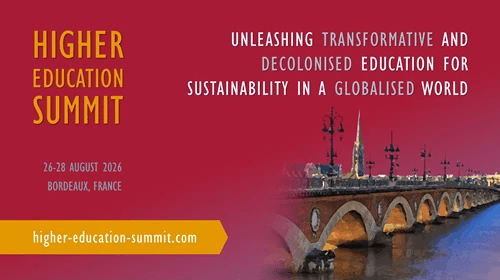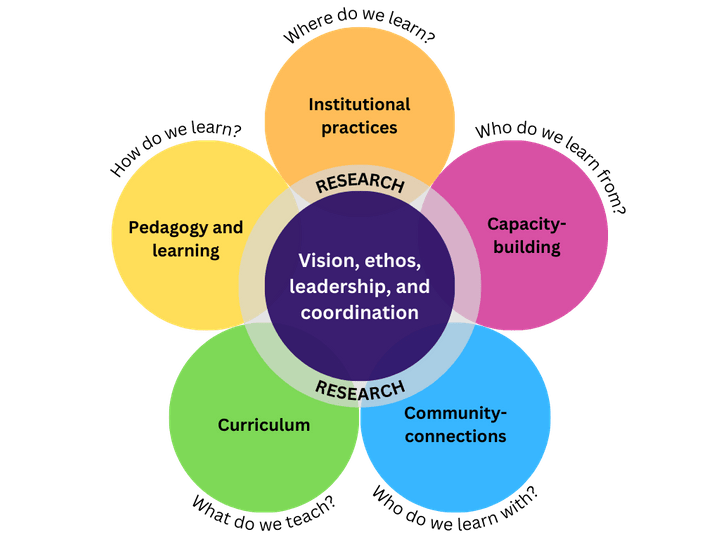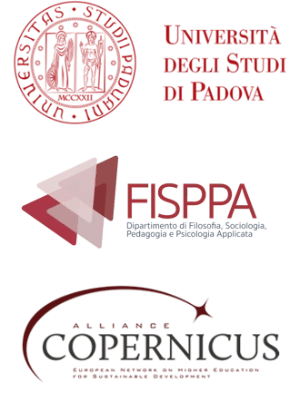
CALL FOR CONTRIBUTIONS
.
Whether you are a passionate educator, a dedicated researcher, a curious undergrad, an eager graduate student, or simply someone with a keen interest in education and sustainability in any context –
we invite you to be a part of this transformative journey in shaping the future of higher education!
The Call for Contributions is closed.

WHAT ARE WE GOING TO TALK ABOUT?
An organization that embodies education for sustainability must take on a whole-institution approach, looking into various dimensions of the institution such as pedagogy and learning, curriculum, community-connections, capacity-building, institutional practices, and vision, ethos, leadership and coordination (Mathie & Wals, 2022). What does such a transformation look like in each dimension and what does it entail?
We invite you to share your research/practices connected to the different organizational dimensions:

1. Vision, ethos, leadership, and coordination
- Why do we learn? What is the purpose behind our teaching?
- Includes learner voice and participation
- At the core of any transformation is the vision of what one is transforming to. In the context of ESD, what is it we aspire our organization to achieve and become? What are the guiding values and principles that would engender authentic sustainability transformation? Who participates in vision-building and how are they involved? How does your organization coordinate amongst the various stakeholders with diverse needs and priorities?

2. Curriculum
Design, content, assessment
- What do we learn?
- Due to the complexity and interrelated nature of sustainability issues, an ESD curriculum is a glocal one – situated in the local context but broadened by a global view. It also seeks to include knowledge and practices often pushed to the periphery. Topics are cross-cutting, integrating ideas from diverse disciplines to enable a richer view, and work among learners is multidisciplinary. What does your curriculum grounded on sustainability look like? What new voices and knowledge does it include?

3. Pedagogy and learning
New/alternative learning processes and learning culture
- How do we learn?
- In this time of rapid and unpredictable change, current pedagogies must inspire curiosity and sustain the motivation of the youth, while helping them navigate the constantly shifting landscape. Sustainability-oriented transformative pedagogies could involve place-based learning, critical reflection and dialogue, experiential learning, and challenge-based learning – to name but a few. How is that organized in your organization?

4. Institutional practices
Walking the talk, experimenting with and learning from creating sustainability on location
- Where do we learn?
- Organizations rooted in sustainability should grow into a living embodiment of ecological consciousness and care, health and well-being, inclusivity, and democratic participation. This can happen in many ways and in various areas of the organization, e.g. in the building, in the cafeteria and in the classrooms, in the library. Think about renewable energy, recycling, a healthy and sustainable canteen, a repair shop, classrooms and plazas with lots of greenery, the conscious use of technology, and the accessibility of spaces, the inclusion of subaltern groups, zero tolerance of discrimination and racism. What makes yours an organization that breathes sustainability? How important are sustainable thinking and action to the users within your organization?

5. Capacity building
Continued professional development of all staff
- Who do we learn from?
- In higher education, it isn’t just the students who need to learn – the teachers, staff, policy-makers, cleaners, and workers must take part in the transformative learning process as well. How can we engage members of the organization’s community to renew knowledge and comprehension of wicked problems and change their practice to address them in a sustainable way? What kind of opportunities or spaces are provided to allow staff to discuss, learn and ask about, listen to, and reflect on sustainability-related issues?

6. Community-connections
School-society interface
- Who do we learn with?
- While it takes a village to raise a child, it takes the whole community to tackle a wicked problem. Organizations are deeply embedded in their social and cultural context, and any transformation must extend beyond the four walls of any organization and into the wider community. The whole community becomes a living laboratory for authentic learning and meaningful engagement. What do we have to offer our partners in the immediate community and vice versa? What does our network look like and how do we expand it toward those who want to learn with us? How do we ensure equitable collaborations? How far do our partnerships go?

HOW CAN YOU TAKE PART?
If you would like to present at this conference, you must first identify which of the dimensions of the whole-institution approach (WIA) to sustainability your proposal falls under. Your proposal might cover more than one dimension; however, you will need to specify the primary one and then mention those that are secondary. Another option is to address the WIA as a whole, with its complexity, potential contradictions and operational challenges. We are also more than happy to welcome proposals from students or teacher-student collaborations.
Please note, that you can submit a maximum of two proposals, one as a primary author and another as a secondary author. You cannot submit two proposals as the primary author.
You can choose among four presentation formats:
- Facilitate a teaching and learning lab
- Present a paper
- Organize a nework corner
- Lead a collective intelligence workshop
Evaluation criteria for proposals:
- Connection to the topic of sustainability explained clearly
- A theoretical basis for conceptualizing sustainability explained clearly
- Quality of writing: well-crafted sentences, clear explanations and logic, accessible language
- For paper presentations: Makes significant contribution to discourse about theory, practice, and/or research

Teaching and learning lab
Would you like to narrate or demonstrate your research/practice in a creative and interactive way? This kind of presentation is for those who are keen on using creative strategies such as videos, theater, graphic arts, poetry, dance, etc., to share their sustainability-oriented practice or research. You could also weave in inquiry or dialogue to actively engage participants and get their feedback.
Duration: 45 minutes (time may change depending on the number of submissions; definitive information will be provided at acceptance notification).
What should the proposals look like?
800-1000 words; The lab could explore the following questions:
- What practice would you like to narrate or demonstrate?
- How did this practice come about and who are normally involved in this practice?
- What research/theory is this practice anchored on?
- How will this be presented to participants? What creative methods will you use?
- In which way can participants contribute?

Paper presentation
Are you carrying out empirical research in any of the dimensions of the WIA to sustainability? Would you like to present a practice that has greatly benefited your institution? This presentation type is for those with data that could support the effectiveness or impact of an innovation or practice to make higher education institutions key actors for sustainability.
Duration: 15 minutes (time may change depending on the number of submissions; definitive information will be provided at acceptance notification).
What should the proposals look like?
800-1000 words; Papers should be based on:
- Research (e.g. quantitative or qualitative research, mixed-methods research, action-research, case study, meta-analysis, design-based research)
- Theory (e.g. conceptual study, model or theory development)
- Practice for sustainability (sustainable practices in a real-world environment, proposes new actions, and practices for formal and informal setting)
- Sustainable organizations-in-action (e.g. policies, culture, behaviors in the organizations to develop a sustainable mindset)

Network corner
Are you looking to get ideas that could spark or reinvigorate your sustainability-oriented plans? Would you like to connect with like-minded researchers or practitioners to get tips on implementing, maintaining, or evaluating a research topic or initiative within your institution? Perhaps you would like to get in touch with existing communities or create a new network of individuals engaged in similar research topics or practices. This presentation type is for you. It’s a chance to meet like-minded researchers, academics, students or practitioners to establish or expand the community.
Duration: 45 minutes (time may change depending on the number of submissions; definitive information will be provided at acceptance notification).
What should the proposals look like?
400 words; The proposal could answer the following questions:
- What is your project idea?
- What are the challenges that you want to share in this network?
- What questions would you like to ask?
- What competencies are you looking for to strengthen your network, and face the challenges you met?

Collective intelligence workshop
If you’re engaged in sustainability-grounded research but are still in the middle of your process, this presentation format could benefit you. Perhaps you would like to share your research to get fresh ideas or a different perspective, or you could be stuck and in need of feedback. You could also be excited to share what you have so far, even if you haven’t completely analyzed your data yet.
Duration: 45 minutes (time may change depending on the number of submissions; definitive information will be provided at acceptance notification).
What should the proposals look like?
400 words; The proposal could answer the following questions:
- What is your project idea?
- What step of your research are you working on?
- In which way can your research contribute to facing sustainability challenges?
- In which way can participants contribute?

ORGANIZERS & CONTACT
The 2024 HIGHER EDUCATION SUMMIT is organized by
the University of Padua and the COPERNICUS Alliance.
If you have any questions, please contact:











